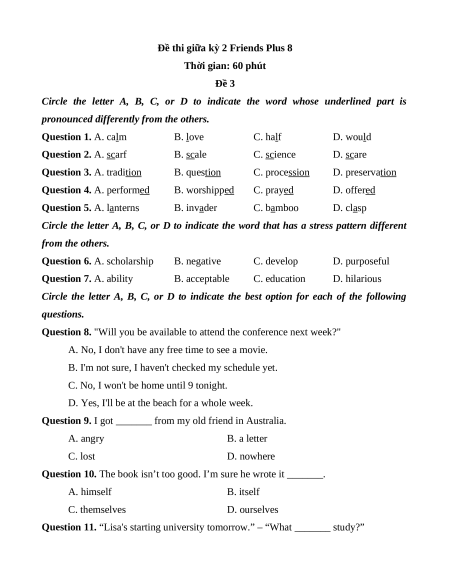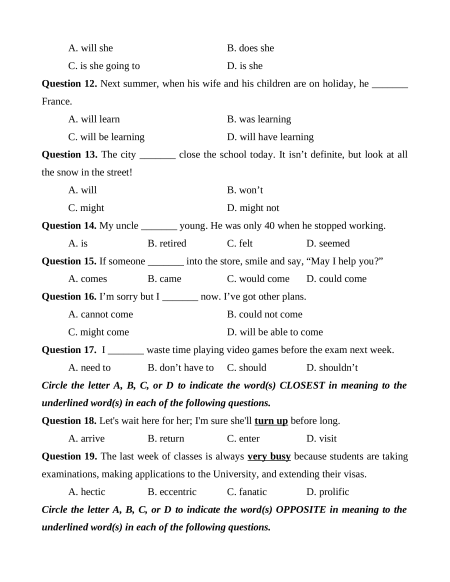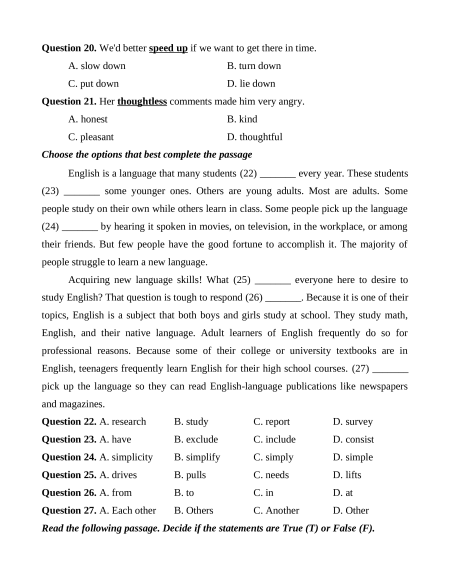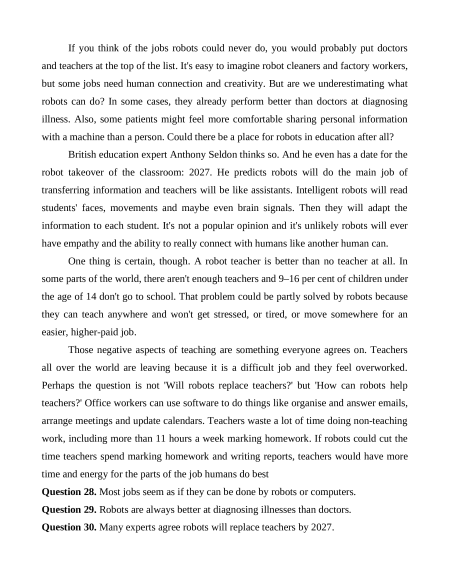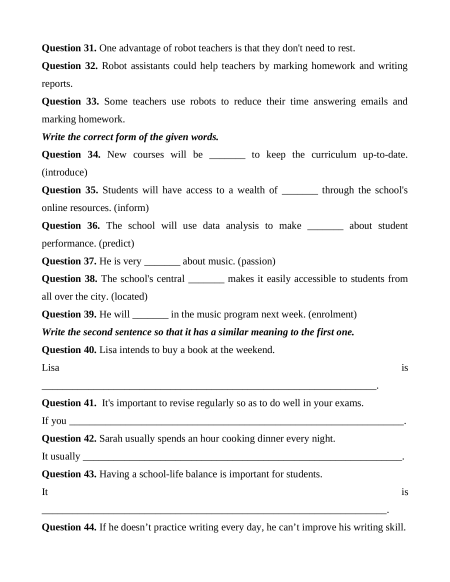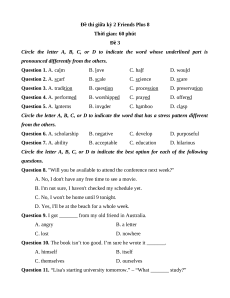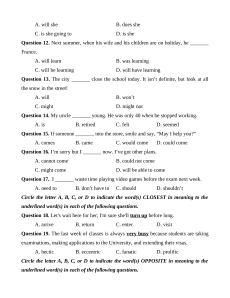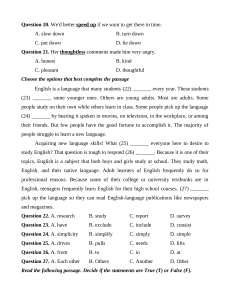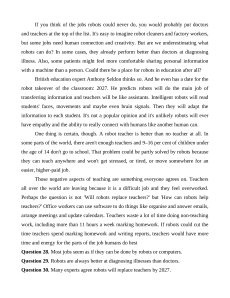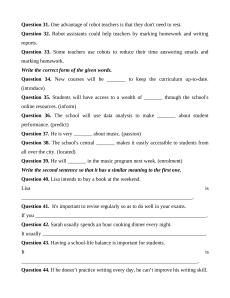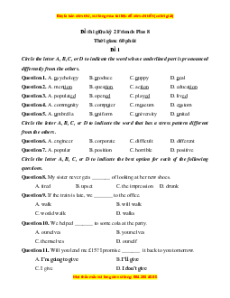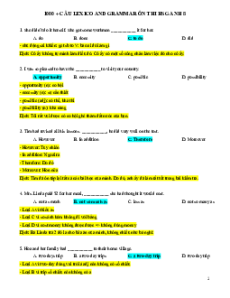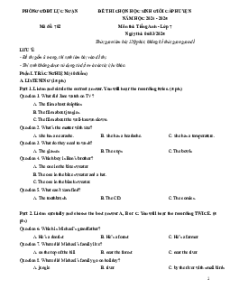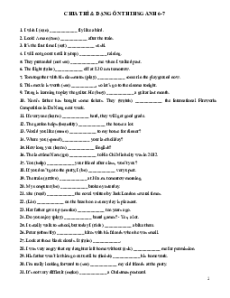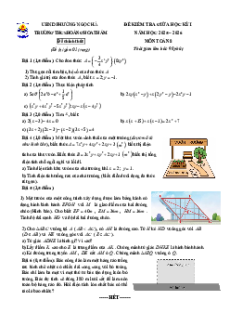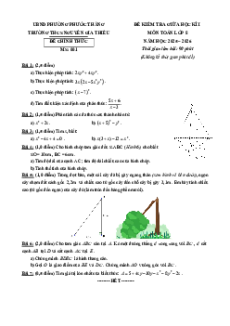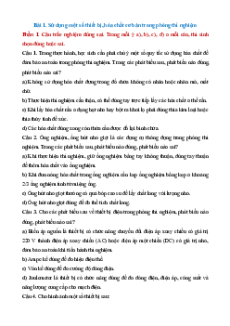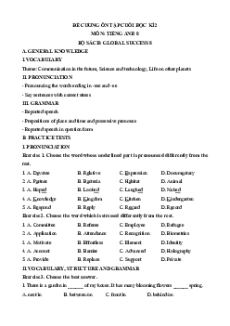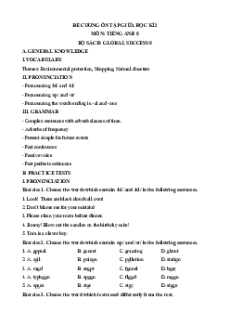Đề thi giữa kỳ 2 Friends Plus 8 Thời gian: 60 phút Đề 3
Circle the letter A, B, C, or D to indicate the word whose underlined part is
pronounced differently from the others. Question 1. A. calm B. love C. half D. would Question 2. A. scarf B. scale C. science D. scare
Question 3. A. tradition B. question C. procession D. preservation
Question 4. A. performed B. worshipped C. prayed D. offered Question 5. A. lanterns B. invader C. bamboo D. clasp
Circle the letter A, B, C, or D to indicate the word that has a stress pattern different
from the others.
Question 6. A. scholarship B. negative C. develop D. purposeful Question 7. A. ability B. acceptable C. education D. hilarious
Circle the letter A, B, C, or D to indicate the best option for each of the following questions.
Question 8. "Will you be available to attend the conference next week?"
A. No, I don't have any free time to see a movie.
B. I'm not sure, I haven't checked my schedule yet.
C. No, I won't be home until 9 tonight.
D. Yes, I'll be at the beach for a whole week.
Question 9. I got _______ from my old friend in Australia. A. angry B. a letter C. lost D. nowhere
Question 10. The book isn’t too good. I’m sure he wrote it _______. A. himself B. itself C. themselves D. ourselves
Question 11. “Lisa's starting university tomorrow.” – “What _______ study?” A. will she B. does she C. is she going to D. is she
Question 12. Next summer, when his wife and his children are on holiday, he _______ France. A. will learn B. was learning C. will be learning D. will have learning
Question 13. The city _______ close the school today. It isn’t definite, but look at all the snow in the street! A. will B. won’t C. might D. might not
Question 14. My uncle _______ young. He was only 40 when he stopped working. A. is B. retired C. felt D. seemed
Question 15. If someone _______ into the store, smile and say, “May I help you?” A. comes B. came C. would come D. could come
Question 16. I’m sorry but I _______ now. I’ve got other plans. A. cannot come B. could not come C. might come D. will be able to come
Question 17. I _______ waste time playing video games before the exam next week. A. need to B. don’t have to C. should D. shouldn’t
Circle the letter A, B, C, or D to indicate the word(s) CLOSEST in meaning to the
underlined word(s) in each of the following questions.
Question 18. Let's wait here for her; I'm sure she'll turn up before long. A. arrive B. return C. enter D. visit
Question 19. The last week of classes is always very busy because students are taking
examinations, making applications to the University, and extending their visas. A. hectic B. eccentric C. fanatic D. prolific
Circle the letter A, B, C, or D to indicate the word(s) OPPOSITE in meaning to the
underlined word(s) in each of the following questions.
Question 20. We'd better speed up if we want to get there in time. A. slow down B. turn down C. put down D. lie down
Question 21. Her thoughtless comments made him very angry. A. honest B. kind C. pleasant D. thoughtful
Choose the options that best complete the passage
English is a language that many students (22) _______ every year. These students
(23) _______ some younger ones. Others are young adults. Most are adults. Some
people study on their own while others learn in class. Some people pick up the language
(24) _______ by hearing it spoken in movies, on television, in the workplace, or among
their friends. But few people have the good fortune to accomplish it. The majority of
people struggle to learn a new language.
Acquiring new language skills! What (25) _______ everyone here to desire to
study English? That question is tough to respond (26) _______. Because it is one of their
topics, English is a subject that both boys and girls study at school. They study math,
English, and their native language. Adult learners of English frequently do so for
professional reasons. Because some of their college or university textbooks are in
English, teenagers frequently learn English for their high school courses. (27) _______
pick up the language so they can read English-language publications like newspapers and magazines.
Question 22. A. research B. study C. report D. survey Question 23. A. have B. exclude C. include D. consist
Question 24. A. simplicity B. simplify C. simply D. simple Question 25. A. drives B. pulls C. needs D. lifts Question 26. A. from B. to C. in D. at
Question 27. A. Each other B. Others C. Another D. Other
Read the following passage. Decide if the statements are True (T) or False (F).
If you think of the jobs robots could never do, you would probably put doctors
and teachers at the top of the list. It's easy to imagine robot cleaners and factory workers,
but some jobs need human connection and creativity. But are we underestimating what
robots can do? In some cases, they already perform better than doctors at diagnosing
illness. Also, some patients might feel more comfortable sharing personal information
with a machine than a person. Could there be a place for robots in education after all?
British education expert Anthony Seldon thinks so. And he even has a date for the
robot takeover of the classroom: 2027. He predicts robots will do the main job of
transferring information and teachers will be like assistants. Intelligent robots will read
students' faces, movements and maybe even brain signals. Then they will adapt the
information to each student. It's not a popular opinion and it's unlikely robots will ever
have empathy and the ability to really connect with humans like another human can.
One thing is certain, though. A robot teacher is better than no teacher at all. In
some parts of the world, there aren't enough teachers and 9–16 per cent of children under
the age of 14 don't go to school. That problem could be partly solved by robots because
they can teach anywhere and won't get stressed, or tired, or move somewhere for an easier, higher-paid job.
Those negative aspects of teaching are something everyone agrees on. Teachers
all over the world are leaving because it is a difficult job and they feel overworked.
Perhaps the question is not 'Will robots replace teachers?' but 'How can robots help
teachers?' Office workers can use software to do things like organise and answer emails,
arrange meetings and update calendars. Teachers waste a lot of time doing non-teaching
work, including more than 11 hours a week marking homework. If robots could cut the
time teachers spend marking homework and writing reports, teachers would have more
time and energy for the parts of the job humans do best
Question 28. Most jobs seem as if they can be done by robots or computers.
Question 29. Robots are always better at diagnosing illnesses than doctors.
Question 30. Many experts agree robots will replace teachers by 2027.
Đề thi giữa kì 2 Tiếng Anh 8 Friends Plus (Đề 3)
599
300 lượt tải
MUA NGAY ĐỂ XEM TOÀN BỘ TÀI LIỆU
CÁCH MUA:
- B1: Gửi phí vào TK:
1133836868- CT TNHH DAU TU VA DV GD VIETJACK - Ngân hàng MB (QR) - B2: Nhắn tin tới Zalo VietJack Official ( nhấn vào đây ) để xác nhận thanh toán và tải tài liệu - giáo án
Liên hệ ngay Hotline hỗ trợ: 084 283 45 85
Chúng tôi đảm bảo đủ số lượng đề đã cam kết hoặc có thể nhiều hơn, tất cả có BẢN WORD, LỜI GIẢI CHI TIẾT và tải về dễ dàng.
Để tải tài liệu gốc về máy bạn click vào nút Tải Xuống ở trên!
Thuộc bộ (mua theo bộ để tiết kiệm hơn):
- Tailieugiaovien.com.vn giới thiệu bộ đề thi giữa kì 2 Tiếng anh 8 Friends Plus mới nhất nhằm giúp Giáo viên có thêm tài liệu tham khảo ra đề thi Tiếng anh lớp 8.
- File word có lời giải chi tiết 100%.
- Mua trọn bộ sẽ tiết kiệm hơn tải lẻ 50%.
Đánh giá
4.6 / 5(599 )5
4
3
2
1
Trọng Bình
Tài liệu hay
Giúp ích cho tôi rất nhiều
Duy Trần
Tài liệu chuẩn
Rất thích tài liệu bên VJ soạn (bám sát chương trình dạy)
